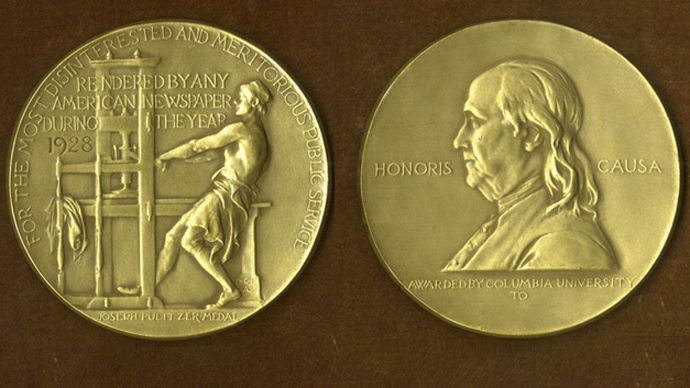The Guardian US and the Washington Post are among the winners of a prestigious journalistic Pulitzer award. The newspapers shared the 2014 Pulitzer Prize for Public Service Reporting for coverage of NSA surveillance and whistleblower Snowden’s leaks.
The prize is awarded “for a distinguished example of
meritorious public service by a newspaper or news site through
the use of its journalistic resources,” according to the
Pulitzer Committee. This includes the use of “stories,
editorials, cartoons, photographs, graphics, videos, databases,
multimedia or interactive presentations or other visual
material.”
The committee stated that it was awarded to the Washington Post
for “its revelation of widespread secret surveillance by the
National Security Agency, marked by authoritative and insightful
reports that helped the public understand how the disclosures fit
into the larger framework of national security.”
It also awarded joint gold to Guardian US for its “revelation
of widespread secret surveillance by the National Security
Agency, helping through aggressive reporting to spark a debate
about the relationship between the government and the public over
issues of security and privacy.”
#BREAKINGNEWS: We have won the Pulitzer Prize for public service for our coverage of Snowden's NSA leaks, along with @GuradianUS.
— Washington Post (@washingtonpost) April 14, 2014
Among Guardian US and Washington Post revelations were some of
the most wide-scale and high-profile disclosures of government
secrets since 1971’s Pentagon Papers on the Vietnam War.
Glenn Greenwald headed up reporting at the Guardian alongside
Ewen MacAskill and film-maker Laura Poitras. Poitras has also
collaborated with the Washington Post’s Barton Gellman, who was
also honored.
The impact of both newspapers’ revelations has sparked global
outrage at the extent of US covert surveillance of its own
citizens and those of other nations. With the help of documents
leaked by former NSA contractor and whistleblower Edward Snowden,
details of clandestine PRISM operations and UK Government
Communication Headquarters (GCHQ) collaboration emerged.
PRISM was employed to acquire data from the stores of nine
internet giants including Google and Facebook.
Other notable releases since last June covered NSA dragnet
surveillance, which was declared illegal by an independent
federal agency in January. The Privacy and Civil Liberties
Oversight Board said the storing of phone data “lacks a
viable legal foundation.”
Surveillance of the phone calls of 35 world leaders has also
garnered controversy.
Snowden released a statement published in the Guardian shortly after the announcement: “Today's decision is a vindication for everyone who believes that the public has a role in government. We owe it to the efforts of the brave reporters and their colleagues who kept working in the face of extraordinary intimidation, including the forced destruction of journalistic materials, the inappropriate use of terrorism laws, and so many other means of pressure to get them to stop what the world now recognises was work of vital public importance.”

